Electrical Switchgear Industry Case Studies
- time:2021-08-23 15:05:50
- source:
Introduction
The electrical switchgear industry is an important branch of the domestic electrical power industry in China. Whether in the construction market, industrial market, or power market, electrical switchgear plays a significant role in all of them. The year 2019 marked a pivotal year for the implementation of the "13th Five-Year Plan" for China's power grid investment and construction. According to the "Action Plan for Distribution Network Construction and Transformation (2015-2020)" issued by the National Energy Administration on August 31, 2015, the plan explicitly aimed to accelerate the construction of modern distribution networks comprehensively. It outlined that the investment in distribution network construction and transformation during the period from 2016 to 2020 should be no less than 1.7 trillion yuan. Distribution network investment would be a key development focus in the coming years, significantly promoting the growth of the electrical switchgear industry in the future.
In the electrical switchgear industry, the processing of cabinet sheet metal components has become a critical focus for various manufacturers. However, in traditional cabinet sheet metal processing workshops, several significant issues often pose challenges for company managers:
1.Workshop Disarray: The workshop floor is often chaotic, with raw materials and semi-finished products scattered around, resulting in inefficient workpiece logistics.
2.Equipment Utilization: Ensuring high equipment uptime can be challenging. Production orders require a high level of expertise from planners and managers. Often, upstream and downstream processes do not align well, significantly reducing equipment utilization rates.
3.Dependence on Skilled Personnel: There is a heavy reliance on skilled sheet metal technicians, and the training period for such technicians is long. Difficulty in finding skilled workers is becoming increasingly apparent in sheet metal workshops.
4.Complex Workshop Management: Workshop management is complex, and delivery times for orders are hard to estimate. For orders with multiple varieties and small quantities, workshop management costs are high, and delivery challenges are frequent. Managers often need to coordinate on-site issues.
One, Solution.
CNC Sheet Metal Bending Unit.In order to enhance the production capacity of electrical switchgear, efforts were made to improve efficiency in various production stages. Through analysis, it was identified that the processing of sheet metal components for the electrical cabinet shell was the bottleneck in the entire production chain. This was particularly true for larger batches of mid-mounted cabinet side panels and front panels. The bending process was relatively complex, with workpieces being up to two meters long and weighing over thirty kilograms. Bending the shorter edges required two people for material handling, making it a physically demanding and time-consuming task. Given the current difficulty in recruiting skilled sheet metal workers, many young individuals were hesitant to take on bending work due to its physically demanding nature. Consequently, the electrical industry actively sought an efficient, automated bending solution that could replace manual bending. Yawei's robotic bending unit perfectly aligned with the industry's requirements and capabilities, providing an ideal solution.

Through the powerful combination of Yawei's specialized electrical cabinet bending machine and Germany's KUKA industrial robot, equipped with multifunctional pneumatic counter-bending dies, it becomes possible to achieve automatic centering, bending, flipping, stacking, and other processes for mid-mounted cabinet side panels and front panels once the robot grabs the workpiece. The robust KUKA robot can continuously process dozens of workpieces, rendering the entire processing unit fully automated.
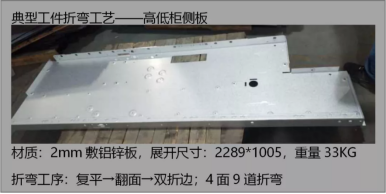
The processing efficiency of the mid-mounted cabinet sheet metal casing has undergone a significant improvement. Taking the example of the high and low cabinet side panels shown above, the robot can now complete four-side bending automatically in just 2 minutes, whereas it used to take two workers 4 minutes to accomplish the same task. Additionally, the accuracy of the bending angles has improved to within 30 minutes, contributing to both enhanced quality and efficiency. More importantly, as the robot has taken over the physically demanding tasks previously performed by manual labor, sheet metal workers have found their work to be much easier. These powerful robots have become the right-hand assistants in modern factories, and the highly flexible Yawei bending unit continues to provide invaluable support to smart factories!
1.2 CNC Sheet Metal Automation Production Line
Leveraging its extensive experience in automation products within the switchgear industry, Yawei has custom-designed a sheet metal automation production line for customers based on their existing facilities, orders, and sheet metal equipment characteristics. Yawei also provides its own sheet metal workshop management software. The automation production line exhibits the following features:
- Automation and flexibility in processing equipment, replacing the current manual labor-intensive processing.
- Effective enhancement of process quality control to ensure a high production yield rate.
- A visual production management system that enables dynamic monitoring of the production process, order tracking, forecasting, and reduces unnecessary manual intervention.
- Maximizing the equipment's processing capacity with equipment fault warnings and rapid response services to improve equipment utilization.
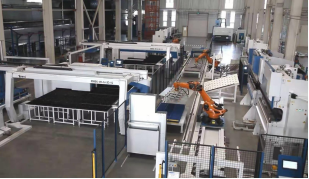
Customized production line
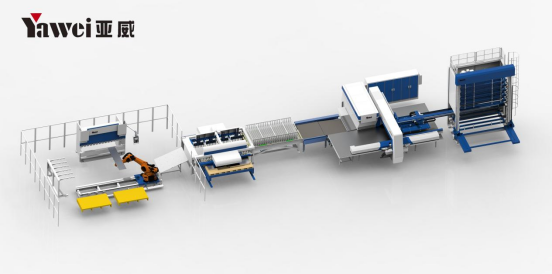
The "AMS-HSP1530 CNC Sheet Metal Punching, Shearing, and Bending Automation Production Line"
1.3 CNC Sheet Metal Intelligent Factory

Yawei has collaborated with influential large enterprises in the electrical switchgear industry, becoming a model project for Yawei's sheet metal equipment in the field of intelligent factories. Positioned as a high-end intelligent production factory, it aims to achieve intelligent processing, intelligent control, intelligent logistics, and visualized production in the project. This involves seamless integration of ERP systems, MES systems, and intelligent warehousing and logistics for efficient and smart operations.
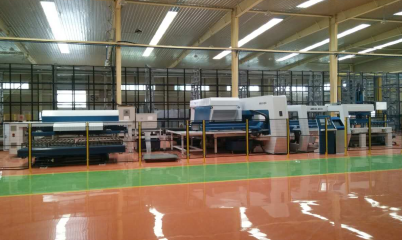
Yawei, in collaboration with the client's initial planning, has introduced a punch-shear combination line in the new factory to replace the conventional CNC turret punch and shearing machines. This new line handles processes such as automatic feeding, punching, forming, shearing, and stacking. Furthermore, a robot bending unit has been employed to replace manual bending operations, handling tasks such as workpiece loading, positioning, bending, and stacking.
At the same time, the equipment has been successfully integrated with a large-scale intelligent warehouse, and it has been seamlessly connected and integrated with the client's MES (Manufacturing Execution System) and WMS (Warehouse Management System). This integration allows for real-time control and management of the machine tools by the MES system during the production process, as well as seamless intelligent material handling between the machine tools and the intelligent warehouse. In the intelligent factory, the MES system facilitates automatic assignment of production tasks to the equipment, real-time reporting and monitoring of equipment during the machining process, automatic statistics and summarization of equipment production and processing status, and automatic material flow and turnover of raw materials and finished products during the equipment processing process. These advanced functions of the MES system have all been successfully realized in the intelligent factory.
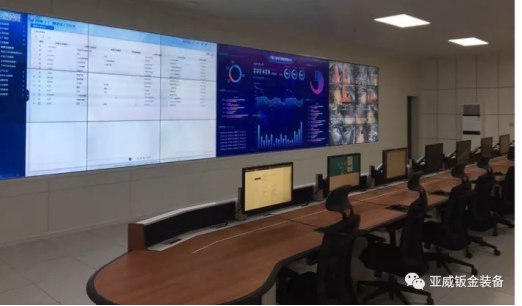
Two, Customer Benefits.
Yawei has helped clients in the electrical industry plan and achieve increased production capacity, as well as seamlessly connect intelligent management systems with machine tools. During the client's production process, Yawei's advanced equipment has successfully addressed several pain points in the client's previous production modes:
- The intelligent cutting feature of the punch-shear combination line perfectly solves the issue of section cutter marks left during punching.
- The automatic unloading and stacking functions of the punch-shear combination line completely eliminate the need for manual removal of micro-connections, reducing workload.
- The shared-edge cutting characteristic of the punch-shear combination line has significantly improved the utilization of raw material sheet metal for the client.
- The pain point of labor-intensive involvement in bending switchgear cabinet body components has been successfully replaced by the robot bending unit through robotic automation, greatly enhancing the consistency of workpiece processing accuracy.
- The interconnection and communication between the punch-shear combination line, robot bending unit, MES system, and WMS system have transformed the previously labor-intensive and constantly tense "daily management" during the production process into a simple and relaxed "exception management."
"Making manufacturing smarter," Yawei will continue to move forward steadily and create more successes in the future.

